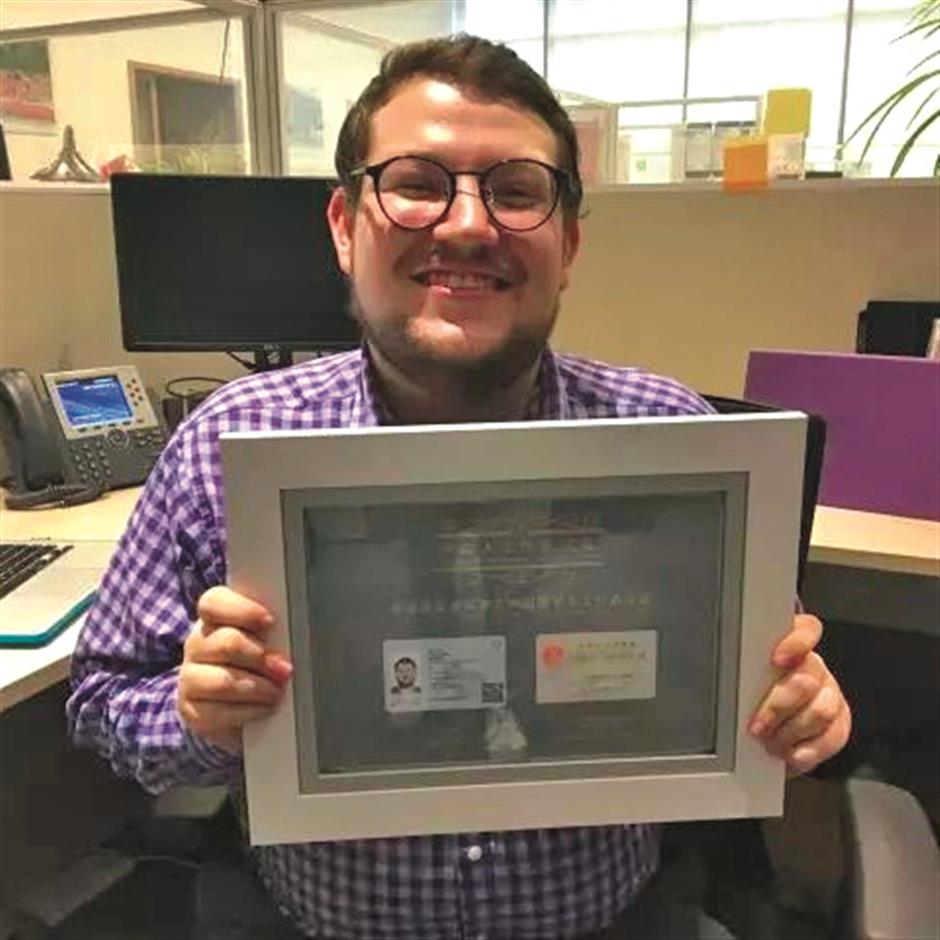Green light to fast-track foreigners' green cards

Foreigners seeking a job in Shanghai talk with recruiters at a job fair. Pudong has introduced a new round of preferential policies to attract and retain foreign professionals.
Pudong has introduced a new round of preferential policies, as well as a special agency for overseas talent, to attract and retain foreign professionals.
The newly established Administration of Overseas Talents offers a one-stop service for skilled workers from abroad as part of the new area’s effort to build a “highland” for professionals from across the world. The administration makes the processing of work permits for foreign workers more efficient. It is responsible for handling applications for Chinese permanent residence permits, or “Chinese green cards,” as well as testing out innovative methods for streamlining administration services.
Chow Hong, general manager with Shanghai Roche Pharmaceuticals, who has German nationality, became the first foreign professional to benefit from the “fast track” process to receive a Chinese green card, or foreigner’s permanent residence card, under the recommendation of the China (Shanghai) Free Trade Zone committee.
Attracting new graduates
The Pudong government has issued the nation’s first work permit for foreign graduates, from local schools, to Tyler Rhorick, an American graduate from New York University Shanghai with a bachelor’s degree. Local foreign graduates with a bachelor’s degree can now apply for a work permit and work in Zhangjiang or other parts of the Shanghai FTZ.
The application process can be shortened from six months to two months. Spouses and children under 18 years old can apply for the card at the same time.
In addition, foreign students with a master’s degree can directly look for jobs in Zhangjiang High-tech Industrial Development Zone and the FTZ.
Previously, foreigners needed to have at least two years’ work experience to apply for work and residence permits in Shanghai, which meant they need to go back to their countries and work for two years before they can apply for jobs in Shanghai.
Shanghai allows regional headquarters of transnational companies, investment companies and foreign-funded research and development centers, which are registered in Zhangjiang and the FTZ, to employ graduates from leading foreign universities, with or without work experience.
The policy lowers requirements for foreigners involved in scientific and technological innovation to obtain a Shanghai Residence Card B, which enables holders to enjoy certain citizen benefits.
Since July 2015, 25 companies in the FTZ have employed 28 foreign graduates from universities in Shanghai with at least a master’s degree. Under the reform, foreign graduates from the “world’s renowned universities” can work at regional headquarters, investment companies and R&D centers registered in the FTZ directly.
The overseas talent administration will publicize a list to define those universities soon, according to Pudong’s human resources and social security bureau.
The work permit duration for professional technical talent has been extended to three years from one for the convenience of the professionals. Foreign doctors, for instance, can come and work in Pudong without renewing their work permits annually.

Tyler Rhorick, an American graduate of New York University Shanghai, shows the first work permit the city has issued for foreign undergraduates without work experience.
More jobs for foreign talent
Pudong has also introduced a number of measures to make it easier for foreign talent to find work and start businesses in the new area.
In the FTZ alone, 680 foreign nationals have received the Chinese green cards under the new policies and 2,052 have been able to apply for a visa-on-arrival since the end of May, according to the exit entry administration office of the public security bureau at the zone.
Wang Ping, head of the office, said his team has been working closely with companies in the FTZ so that the new policies can benefit more foreigners.
“It takes a lot of publicity for the policies to be fully taken advantage of,” he said. “It happens that foreigners told me that they had no idea of certain new visa rules from which they could benefit.”
Lectures and consultant meetings are regularly held for company representatives from human resources’ departments, and police are on hand to help.
“We take notes of all problems,” Wang said, adding that efforts are then made to resolve them or communicate with higher-level exit-entry administrations in the policy-making process.
Under the initiative of his team, an informal exit-entry consultant body has been set up, joined by about 20 company representatives and economy scholars with an interest in the FTZ. Two meetings have been held since 2015, and another is planned for 2017, according to Wang.
Wang, who has been working at exit-entry administrations in the Waigaoqiao area for more than 20 years, has received an award from the Ministry of Public Security for his dedicated work as a police officer.
“We are facing an increasing number of visa and green card requests from the companies in the Shanghai FTZ with new policies and booming business here,” he said.
In Waigaoqiao alone, there are more than 10,000 companies from about 100 countries and regions.
‘1+X’ program
Moreover, Pudong also plans to launch a “1+X” policy review that is intended to introduce wide-ranging reforms to the way it deals with overseas talent.
The “1” refers to an overarching review of the area’s policies toward overseas talent to identify potential institutional reforms and ideas for new policies to make the district more attractive to highly-skilled foreign workers. The “X” indicates the specific reforms that will be carried out after the review.
















